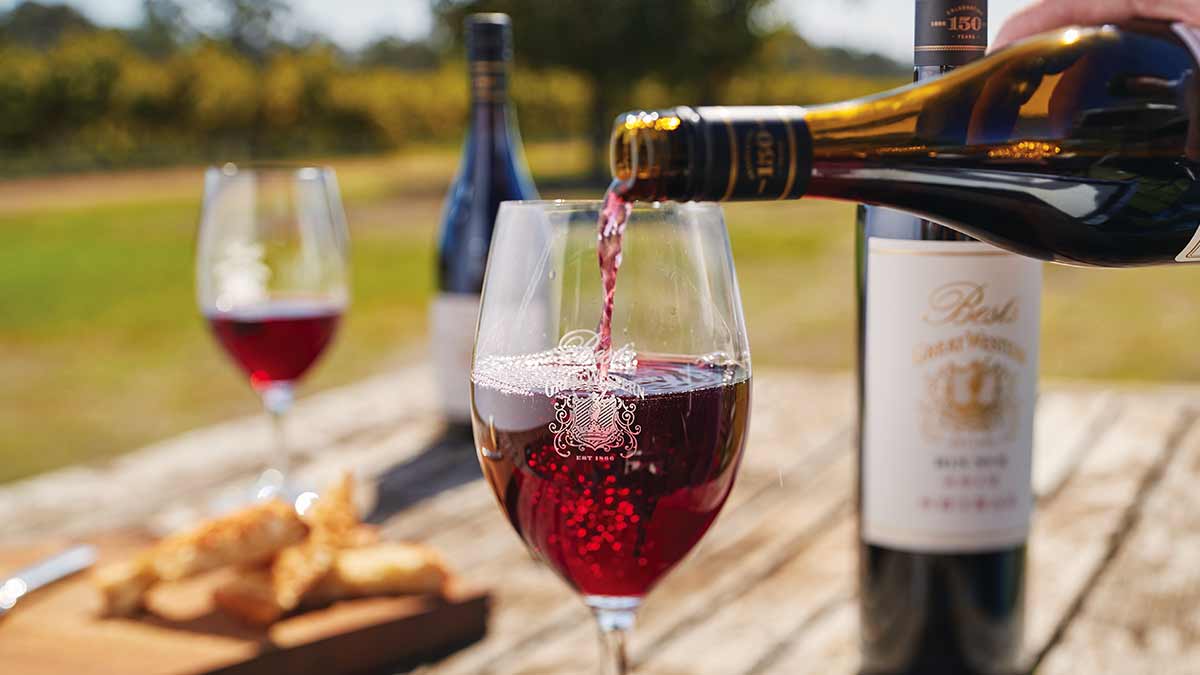By Bob Lipinski
Serving wine at home, on a picnic or during a festive occasion is fun and with just a few simple tips listed below, you will be on your way to an enjoyable time.
Opening Table and Sparkling Wines
Table wines. Cut the capsule near the bottle’s neck, then remove it using the edge of the knife blade. Insert the point of the corkscrew’s worm into the cork and with a gentle downward pressure, screw the worm clockwise until only one notch is showing. Then, attach the corkscrew’s lever to the lip on top of the bottle and while holding it firmly, lift the handle of the corkscrew in a straight motion until the cork comes out of the bottle.

Opening A Bottle of Wine
Sparkling wines. Remove the foil capsule; untwist and loosen the wire cage but do not remove it. Hold the bottle at a 45-degree angle pointed away from you and anyone around you; while holding the cork in one hand, twist the bottle in a downward motion with the other hand. Allow the cork to ease out until a gentle “pop” is heard. Continue to hold the bottle at this angle for a few more moments to equalize the pressure inside the bottle. Then stand the bottle up; it is ready to pour. Under no circumstances ever use a corkscrew to open a bottle of sparkling wine.
Serving Tips
- White and sparkling wine can be chilled in 20 minutes if immersed in an ice bucket containing a mixture of ice and cold water.
- A wine glass should have a stem and contain between 6–10 oz.
- Champagne glasses should be flute or tulip-shaped, rather than the flat, “saucer-shaped” glass.
- Wine glasses should be filled only one-third for white wines and one-half to two-thirds for red wines.
Serving Temperatures for Table Wines (Fahrenheit)
- Dry white wines 50–55 degrees
- Dry, light-bodied red and rosé wines 60–65 degrees
- Dry, full-bodied red wines 65–68 degrees
- Sparkling wines 42–46 degrees
- Sweet red and white wines 42–46 degrees
Proper Order of Serving Wines
- Light wines should precede heavy or full-bodied wines.
- Dry wines should precede sweet wines.
- Dry white wines should precede dry red wines.
- Dry red wines should precede sweet white wines.
- Dry sparkling wines can be served before, during or after dinner, while sweet sparkling wines are best after dinner.
- Port, Sherry, Madeira, and Marsala are generally served after dinner. However, the dry versions—White Port, Fino Sherry, Sercial Madeira, and Dry Marsala can be served before dinner.
Well, there you have it. Now go and enjoy yourself!
Bob Lipinski is the author of 10 books, including “101: Everything You Need To Know About Whiskey” and “Italian Wine & Cheese Made Simple” (available on Amazon.com). He conducts training seminars on Wine, Spirits, and Food and is available for speaking engagements. He can be reached at www.boblipinski.com OR bkjm@hotmail.com


 Bob Lipinski, author of 10 books; writes, consults, and conducts training seminars on Wine, Spirits, and Food and is available for speaking engagements.
Bob Lipinski, author of 10 books; writes, consults, and conducts training seminars on Wine, Spirits, and Food and is available for speaking engagements.
Recent Comments